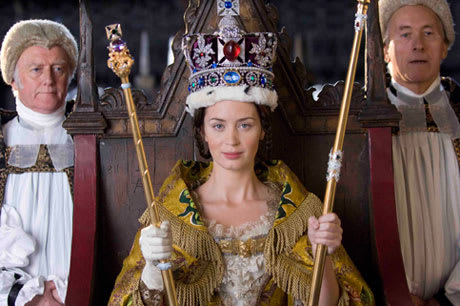For all of its lavish set design, impeccable costuming and muscular shot composition, The Young Victoria cannot surpass one major obstacle: the history of Queen Victoria is rather dry, not lending itself well to cinematic adaptation, especially when presented with patronizing simplicity.
Sure, the drama in political office, with Lord Melbourne (played by Paul Bettany), the Whig Prime Minister, strongly influencing her actions, provides some dramatic context but the nitty-gritty of Radical and Tory rebellion in the face of certain constitutions proves too mundane for more than passing expositional mentions.
On the narrative front, this film about the longest reigning monarch focuses its attention chiefly on Victoria (Emily Blunt), a young woman ascending to the throne despite repeated interventions from her mother, the Duchess of Kent (Miranda Richardson), and her Svengali, Lord Conroy (Mark Strong). The struggle here is that of female empowerment in a vacuum of constant manipulation and deception, which conveniently supplies a romantic predicament when Victoria gets all tingly for her first cousin, Albert (Rupert Friend).
Eventually there's a slow motion assassination attempt, which acts as a somewhat lacklustre climax, while the majority of the story chortles forward with clunky dialogue that reaches its wittiest when comparing Melbourne and Albert's beguiling of Victoria to chess, a metaphor no less subtle than that of the mirror as a representation of forced introspection.
Further detracting from success and impact is Vallee's tendency to cut away before the emotional vitality of a scene takes aim, leaving each formal shot to capture the dialogue and facts without any sort of resonance. It's pretty to look at and commendable for this lack of romanticized palette but is inappropriate, given that the film is essentially about self-discovery and internal conflict.
There are those, however, who will appreciate being told how to feel at every turn, with villains clearly distinguished as dog-kicking monsters, while mealy exposition with broad headlines fills in the blanks. In this capacity, The Young Victoria succeeds on every front.
(Alliance)Sure, the drama in political office, with Lord Melbourne (played by Paul Bettany), the Whig Prime Minister, strongly influencing her actions, provides some dramatic context but the nitty-gritty of Radical and Tory rebellion in the face of certain constitutions proves too mundane for more than passing expositional mentions.
On the narrative front, this film about the longest reigning monarch focuses its attention chiefly on Victoria (Emily Blunt), a young woman ascending to the throne despite repeated interventions from her mother, the Duchess of Kent (Miranda Richardson), and her Svengali, Lord Conroy (Mark Strong). The struggle here is that of female empowerment in a vacuum of constant manipulation and deception, which conveniently supplies a romantic predicament when Victoria gets all tingly for her first cousin, Albert (Rupert Friend).
Eventually there's a slow motion assassination attempt, which acts as a somewhat lacklustre climax, while the majority of the story chortles forward with clunky dialogue that reaches its wittiest when comparing Melbourne and Albert's beguiling of Victoria to chess, a metaphor no less subtle than that of the mirror as a representation of forced introspection.
Further detracting from success and impact is Vallee's tendency to cut away before the emotional vitality of a scene takes aim, leaving each formal shot to capture the dialogue and facts without any sort of resonance. It's pretty to look at and commendable for this lack of romanticized palette but is inappropriate, given that the film is essentially about self-discovery and internal conflict.
There are those, however, who will appreciate being told how to feel at every turn, with villains clearly distinguished as dog-kicking monsters, while mealy exposition with broad headlines fills in the blanks. In this capacity, The Young Victoria succeeds on every front.




